Group Participation Expectations
Overview of Group Support
Group Support is a unique kind of support where a group of people, likely to be experiencing similar challenges in the period of their lives, get together to share their difficulties. As a result, group participants give and at the same time, receive help from one another.
The Epilepsy Association of Calgary (EAC) does its best to ensure a safe environment that is conducive to sharing and accepting of one another, where trust grows and where each and everyone feels respected and valued.
There are things that you need to know, and actions you need to take to help make the experience a positive one:
- Make every effort to attend on time. This contributes to a respectful environment.
- Participate fully in group discussions and activities to get the most benefit and growth from our groups. Examples include:
- Trying the activities, participating in discussions, and completing any home-work/pre-work.
- Treating others in the group with the same courtesy that you would like to receive.
- Encouraging and validating the views and information shared by others as appropriate and refraining from providing unsolicited advice
- Some topics may create discomfort. Participants have the option to decline to answer any question or take part in any activity at their sole discretion.
- Be aware of how virtual/online groups may differ from an in-person group, as it pertains to etiquette:
- Virtual group participation, and email technology, will not be the same experience as in-person. However, group facilitators work to ensure a positive experience.
- There may be times, when they, or any group participant, may miss or misunderstand typical conversational/visual cues. The chat feature is available for asking for clarification by both facilitators and participants.
- Access to video/audio is a requirement for participating in virtual groups. Participants are expected to mute the microphone when not speaking to avoid introducing background noise.
- When absent for a short time, participants are asked to let the facilitator know by typing a message through personal chat to alert the facilitator. Facilitators may contact participants by phone who are absent for more than ten minutes to verify no medical emergency exists.
- Be aware of how virtual/online groups may differ from an in-person group as it pertains to the risks and limitations of technology:
- Therapeutic limitations – Potential for misunderstandings when two people are not in the same room. In addition, it may be difficult for the group facilitator to monitor your distress, therefore you will need to inform them directly if additional follow-up supports are needed.
- Technology limitations – Equipment failure or insufficient internet service may impact services.
- Privacy considerations – While efforts will be made to protect privacy, information transmitted via the internet is subject to interception. Participants are encouraged to check with their Internet Service Provider to ensure security precautions are current and refrain from using public wireless (Wi-Fi) services.
- Ethical conduct – Group members are not bound by the same ethical and legal rules as counsellors, and while members are requested to keep others information private, information privacy cannot be guaranteed by group facilitators.
- Personal identification – Names posted on Zoom or other online streaming services may reveal information about you to the group. Consider posting just your first name, or a nickname in the group session.
- Environmental considerations – Participants are responsible for ensuring they are in a private and confidential space and that others who may be present in their home (or other space occupied) are not witnessing the group session.
- Chat feature – Online delivery of programming means you will have access to an online messaging service during the session, also known as “chat”. You and other participants may choose to use this feature to connect directly via typed messages with other individuals in the group. You are not required to respond to messages that are directed to you unless you choose to do so. Likewise, please be aware that others may choose not to respond to messages sent to them by you. Participation in the chat feature is entirely voluntary except for as described under Section 3.
- Zero tolerance for harassment. Safety is of utmost importance, therefore verbal harassment to others will not be tolerated. Anyone who violates this rule will be removed from group and will be called by the facilitator to discuss expectations for returning.
- Participants may withdraw from the group at any time and are encouraged to contact the group facilitator to discuss the potential benefit of other resources.
- Your feedback is encouraged. EAC requests feedback from all our groups, your involvement and feedback help ensure high quality programs. Participation in requests for feed-back through surveys and other forms of follow-up are voluntary but encouraged.
[contact-form-7 id=”3522″ title=”Group Participation Expectations Form”]
Please remember to complete the CONSENT FORM as well.
Do you have an idea for a workshop? Or a suggestion for our new peer support program? We want to hear from you! Call 403-230-2764, ext 105 or email us your idea.
